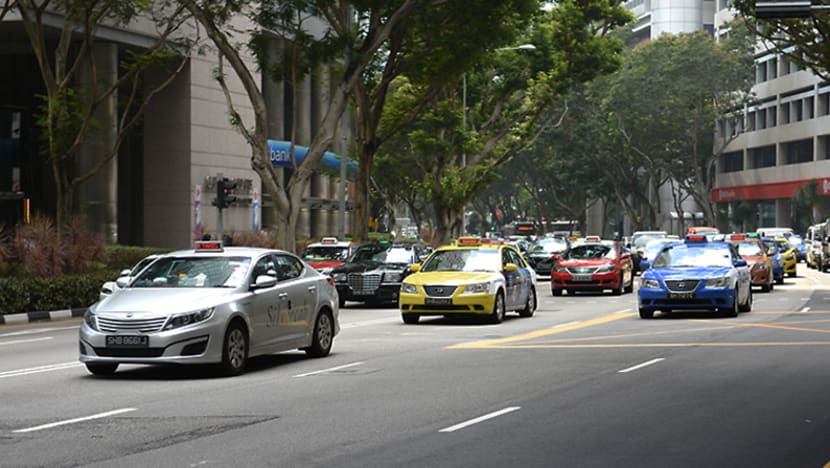Fewer taxi fare evasion cases amid declining ridership

Taxis on the road in Singapore's central business district. (File photo: Calvin Oh)
SINGAPORE: Taxi fare evasion cases have dropped in recent years, in tandem with a decline in ridership amid the emergence of private-hire car services.
Figures provided by the Public Transport Council (PTC) showed there were 104 cases of taxi fare evasion last year – down about 57 per cent from 2015, when there were 240 such cases. In 2019, the number was 166.
Fare evasion cases predominantly involved cash payments, the PTC said.
This comes as Singapore’s taxi population has decreased, with Land Transport Authority (LTA) data showing the number of cabs standing at 15,497 as of July this year – a decrease of about 45 per cent from 2016, when there were 28,258 cabs in the country.
LTA figures also show that street-hail rides – which can only be taken by taxis – made up just about 19 per cent of all “point-to-point” trips this year.
Both taxis and private-hire cars have also seen a decline in ridership amid the COVID-19 pandemic.
On Oct 30 last year, the Point-to-Point Transport Regulatory Framework came into effect, with the aim of giving LTA and PTC greater regulatory oversight over the taxi and private-hire sectors.
In addition to requiring that ride-hail firms such as Grab and Gojek be licensed, the framework also gives PTC the powers to enforce against fare evasion by passengers as well as overcharging by drivers on trips booked through ride-hail operators.
The PTC previously oversaw enforcement against taxi fare evasions, prior to the introduction of the new framework.
In response to queries from CNA, a spokesperson for the council said 57 fare evasion cases were referred to PTC and LTA for investigations between November 2020 and June this year.
This comes up to an average of about seven such cases a month.
Of these, 48 were street-hail fare evasion cases while nine were ride-hail cases, said the PTC spokesperson, adding that fares for 21 cases were successfully recovered.
One case resulted in court action, while three are still being investigated, the PTC added.
“For the remaining cases, there were either insufficient details on the passenger to warrant further investigation, the driver had decided not to pursue the matter or the fare had been settled privately between the driver and passenger,” the council said.
During that time there were also 30 reported cases of overcharging by taxi drivers, and four cases of overcharging by private-hire car drivers, the PTC said. Drivers found to have overcharged passengers were given warnings or sent for counselling.
Passengers who do not pay their fares face a fine of S$200 for the first offence and S$400 for a second offence, on top of making restitution of the unpaid fare.
Mr Ang Hin Kee, who is adviser to both the National Taxi Association and the National Private-Hire Vehicle Association, attributed the decline in such cases to the increased use of mobile applications in booking taxi and private-hire rides, as well as the use of credit cards to pay for such trips.
Taxi and ride-hail platforms have also started to blacklist offenders, said Mr Ang, who is also assistant director-general of the National Trades Union Congress.
CABBIES REIMBURSED ON CASE-BY-CASE BASIS: COMFORTDELGRO
Ride-hailing giant Grab said it pays its private-hire drivers first in cases where passengers do not pay their fares.
These passengers will receive a notification via the Grab app informing them that they need to pay the outstanding amount, and their account will be suspended until this payment is made.
ComfortDelGro, which has the biggest fleet of taxis in Singapore with more than 10,000 vehicles, said it has not seen an increase in fare evasion cases this year.
It takes a serious view of non-payment by passengers and plays "an active role" in helping taxi drivers recover fares, said ComfortDelGro group chief branding and communications officer Tammy Tan.
Cabbies are advised to lodge a police report, and the company will look into each case after a report has been made. If passengers refuse to comply, the cases are referred to the LTA, said Ms Tan.
“As a gesture of goodwill, the company will try to reimburse cabbies but that is on a case to case basis,” she added. “We will continue to assist our cabbies the best we can to ensure that they are not cheated of their livelihood.”
Despite the decline in incidents, reports of taxi fare evasion cases continue to make the headlines.
In October last year, a teenager was sentenced to a year of reformative training after exploiting a loophole on ComfortDelGro’s mobile app to cheat the taxi operator out of 117 cab rides worth S$2,600.
And in June this year, a 31-year-old delivery man was sentenced to two weeks in jail and fined S$2,000 for assaulting a taxi driver after refusing to pay the fare.
Mr Ang suggested companies could help by ensuring faster enforcement against fare evasion cases, as well as raising public awareness.
This could act to deter such incidents in the future, he said, though he noted commuters here are “mostly courteous, kind and generous”.
















